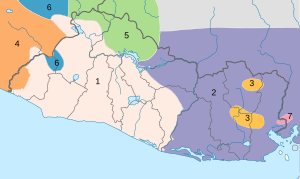Social:Salvadoran Lenca
| Lencan | |
|---|---|
| Native to | El Salvador |
| Ethnicity | Lenca people |
| Extinct | by 2007, some semi-speakers remain |
Lencan
| |
| Language codes | |
| ISO 639-3 | None (mis) |
| Glottolog | lenc1243[1] |
 | |

Salvadoran Lenca was spoken in Chilanga and Potón. Lencans had arrived in El Salvador about 2,000 years B.C.E and founded the site of Quelepa. One speaker remains in Potón.[citation needed]
Salvadoran Lenca is of the small language family of Lencan languages that consists of two languages one of which is the Salvadoran Lenca and the Honduran Lenca. There have been attempts to link the Lencan languages to other languages within their groupings, but there has been no success. [3]
Phonology
Consonants
| Labial | Alveolar | Palatal | Velar | Glottal | ||
|---|---|---|---|---|---|---|
| Nasal | m | n | ||||
| Plosive | voiceless | p | t | k | ||
| ejective | pʼ | tʼ | kʼ | |||
| Affricate | t͡sʼ | t͡ʃʼ | ||||
| Fricative | s | ʃ | h | |||
| Lateral | l | |||||
| Rhotic | r | |||||
| Glide | w | j | ||||
- Obstruents can be voiced allophonically.
Vowels
| Front | Back | |
|---|---|---|
| Close | i | u |
| Mid | e | o |
| Open | a | |
Lenca Potón
As of 2012, Mario Salvador Hernández of Guatajiagua is the last speaker of Lenca Potón, which differs from the version spoken in Chilanga, where the language has disappeared. Research in 2004 by the University of El Salvador recorded 380 words, five vowels and 16 consonants, alternation between “g” and “k”, with reduplication to create plurals from singular forms.[5]
References
- ↑ Hammarström, Harald; Forkel, Robert; Haspelmath, Martin, eds (2017). "Lenca-Salvador". Glottolog 3.0. Jena, Germany: Max Planck Institute for the Science of Human History. http://glottolog.org/resource/languoid/id/lenc1243.
- ↑ Atlas of the World’s Languages in Danger (Report) (3rd ed.). UNESCO. 2010. p. 13. https://unesdoc.unesco.org/ark:/48223/pf0000187026.
- ↑ Campbell, Lyle. Glossary of Historical Linguistics. Edinburgh University Press, 2007.
- ↑ 4.0 4.1 Del Río Urrutía, 1999
- ↑ Liliana Fuentes Monroy (2012). "Buscan rescatar lengua potón". La Prensa. http://www.laprensagrafica.com/el-salvador/departamentos/279667-buscan-rescatar-lengua-poton.html. Retrieved 2012-09-30.
- Roque, Consuelo; Manuel Antonio Ramírez Suárez (2004). Cultura lenca de Guatajiagua. Universidad de El Salvador. ISBN 978-99923-27-20-3. https://books.google.com/books?id=NQlrAAAAMAAJ. Retrieved 30 September 2012.
- Del Río Urrutía, Ximena. 1999. El lenca de Chilanga. Revista de Filología y Lingüística de la Universidad de Costa Rica 25. 193-209.
- Campbell, Lyle. 1976. "The Last Lenca". International Journal of American Linguistics 42(1): 73–78.
 |

